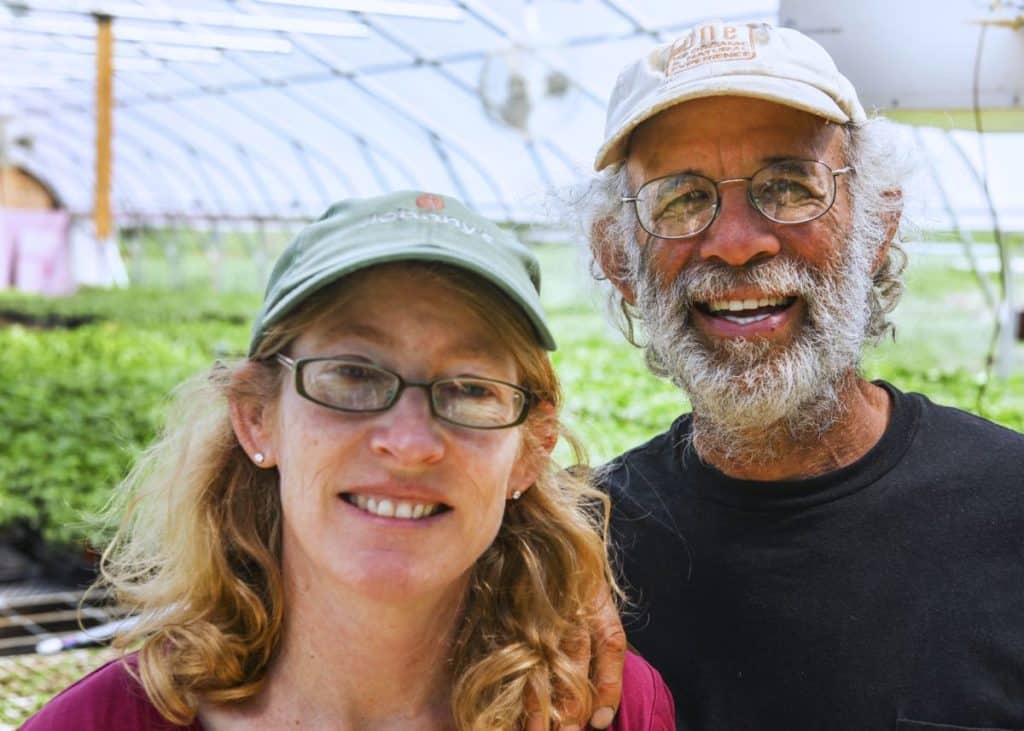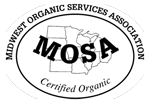Monthly Archives: November 2013
Winter share, delivery #1
- On: November 20, 2013
 0
0
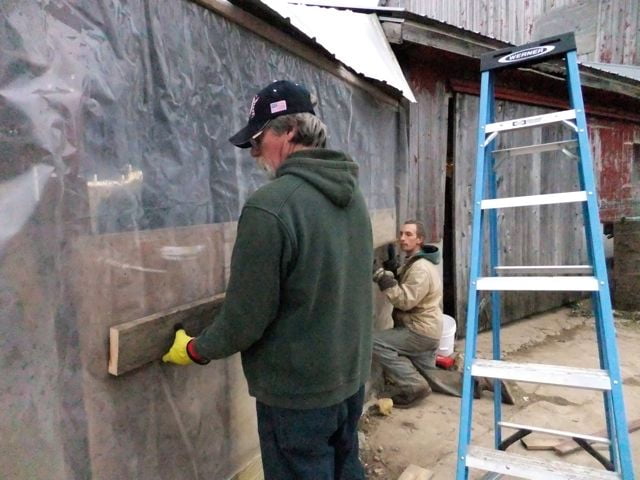
Larry and Noah winterize the outdoor washroom. It’s too cold to work in this space during winter but we appreciate the protection from wind and snow drifts. We will store equipment in here until spring.
Things you need to know about your winter share.
* Your delivery will consist of two different boxes, labeled “A” and “B”. The boxes contain different vegetables. Take one “A” box and one “B” box.
* Please pick up your boxes on the day of delivery, during the normal hours for your site. Don’t count on picking up late or the next day. It will be cold during the deliveries and the produce may freeze overnight at the unheated sites.
* We are sending all of the winter squash in this first delivery.
* Don’t feel that you have to eat all this food before the second delivery! Much of it will store quite well. See below.
* The second (and final) winter share delivery will be on Thursday December 12 (Madison, Middleton, Oregon and Evansville) and Friday December 13 (Milwaukee area, Janesville).
* Local Thyme is not supplying specific recipes for the winter boxes. However, we have access to the entire catalog of Local Thyme recipes all winter. Check them out for your Thanksgiving ideas.
Winter share strategy
* These vegetables are the most perishable: scallions, bok choy, and butternuts with flaws.
* These are the next-most perishable: cranberries, leeks, Brussels sprouts, butternut squash. Watch your winter squash closely and use quickly if you see any signs of deterioration.
* These will last the longest: Beauty Heart radish, beets, carrots, garlic, onions, potatoes, sweet potatoes.
Veggie List and Storage Info (winter share, delivery #1)
Box “A”
Butternut squash, 1 large and 1 medium
Satina yellow potatoes, 5 lb
Adirondack Blue potatoes, 3 lb
Sweet potatoes, 5 lb
Garlic, 1 small bulb
Box “B”
Beauty Heart winter radish, about 2
Golden beets plus some “Badger Gold” beets, 3 1/3 lb total
Brussels sprouts, 1.5 lb
Carrots, 5 lb
Cranberries, 1 pint
Leeks, 3 lb
Scallions, 1 bunch
Yellow onions, 5 lb
Bok choy, 1 medium head
Here’s what we think will be in the December delivery: beets, green cabbage, red cabbage, carrots, celeriac, leeks, onions, parsnips, russet potatoes, yellow potatoes, rutabaga, sweet potatoes, Beauty Heart winter radishes.
Beets – Refrigerate in a plastic bag. Beets will store for two months or longer. You will receive a mix of golden beets (2 1/3 lb, round, gold inside) and “Badger Gold” beets (1 lb, longer, russeted skin on shoulders, striped inside). Remember our collaborative carrot trial with research scientists from UW/Madison this summer? “Badger Gold” was developed by Prof. Irwin Goldman of the Horticulture Department. It will be one of the first varieties to be released through the radical Open Source Seed Initiative (OSSI). It is an excellent, sweet golden beet, with lovely concentric rings inside. Irwin says it is even good raw. We were thrilled that Irwin offered us a bit of seed to try this year. It is not available for sale yet, so this is the farmer-equivalent of getting past the velvet rope at an exclusive club.
Bok choy – Refrigerate and use soon.
Carrots. Refrigerate in a plastic bag. Will keep for several weeks.
Cranberries. Refrigerate. Freeze if you don’t expect to use within several weeks. These organic cranberries are from Ruesch Farms in central Wisconsin. They are of very beautiful quality because they were harvested by ‘dry raking’ instead of a wet harvest in which the field is flooded. Brian Ruesch says that dry raking is more work for them but preserves the quality and storage life of the cranberries.
Garlic. Can be stored at room temperature. As I mentioned in previous newsletters, the midwestern garlic crop failed this year so we only have one small bulb for each of you.
Leeks. Refrigerate and eat within three weeks. Leeks are not a long-storage crop. You may need to strip off one or two outer leaves to freshen the leeks before you cook them.
Onions: Store in a cool, dark spot or refrigerate. Protect from light. Exposure to light stimulates sprouting.
Potatoes: Can be stored at room temperature or in a cool spot, but must be kept in the dark, or they will turn green. They will store longer if kept cool. Around 40 – 50 F is ideal. Keep them in the paper bag we sent them in, or cover the potatoes with a cloth. The potatoes are from Chris Malek of Malek Family Stewardship Farm. Everyone will receive 5 lb. Satina potatoes. These have light yellow flesh and are a good all-purpose potato. Everyone will also receive 3 lb of blue-fleshed potatoes. They are a pretty addition to roasted potato dishes.
Sweet potatoes – Wow, the sweet potato crop turned out so well this year. These are the Covington variety, and have developed excellent flavor and sweetness. Store at room temperature, no lower than 55 F. Keep them on your kitchen counter where it’s easy to keep an eye on them. The roots come in a wide ranges of sizes and all are good. The sweet potatoes are not washed. We don’t like to wet them this time of year without a warm place to dry them.
Winter squash – You will receive two butternut squash, one large and one medium. Almost all are our Waltham variety which tends to grow big squashes. Some squash have minor flaws. Identify and use that squash first. Store winter squash in a cool, dry place. 50 F is ideal. Do not put in a plastic bag. Inspect your squash frequently and cook if you see any soft spots developing. You can cook, mash and freeze the squash for future use. I find that you can refrigerate cut raw squash for up to one week. This runs counter to the accepted way to store squash, but is useful if you want to cook just half a squash at one time. Try microwaving your squash for one to two minutes before cutting or peeling. This softens the squash and makes large butternuts easier to handle.
What are you planning for your Thanksgiving meal?
I thought I’d share our plans. We are a family of cooks. We plan to prepare a heritage breed turkey from Matt Smith at Blue Valley Gardens, brined overnight (Beth), stuffing (Beth’s mom), Brussels sprouts with garlic-mustard vinaigrette (Steve), roasted sweet potatoes (Sophie), glazed butternut squash (Beth), crunchy carrot-Beauty Heart salad with sesame-seed dressing (Steve), homemade applesauce (Ari), pickles (Ari), cranberry sauce (friends), and apple pie (Sophie). We love Thanksgiving!
Leek-Vegetable Fritters With Lemon Cream
While packing CSA boxes, crew member Jon rapsodized about a leek fritter recipe he enjoys. It was a chilly day and we were getting hungry. I think every person went home and made those leek fritters, including me. They are tasty and mild, true comfort food. I’ll list the ingredients here, and you can read the recipe online. We skipped the sour cream and used Greek yogurt instead. The recipe is from Deb Perelman of Smitten Kitchen.
For the fritters:
2 pounds leeks, pale green and white parts only (or use 1 pound leeks and 1 pound cooked vegetables like carrots, potatoes, summer squash, beets, zucchini)
Salt
2 scallions, trimmed, halved lengthwise and thinly sliced
1/4 cup all-purpose flour
1 teaspoon baking powder
Freshly ground black pepper
Pinch cayenne
1 egg
Vegetable oil, for frying
For the cream:
1/2 cup sour cream
1 tablespoon freshly squeezed lemon juice
Pinch freshly grated lemon zest
Salt
Read the recipe here.
Goodbye.
- On: November 13, 2013
 0
0
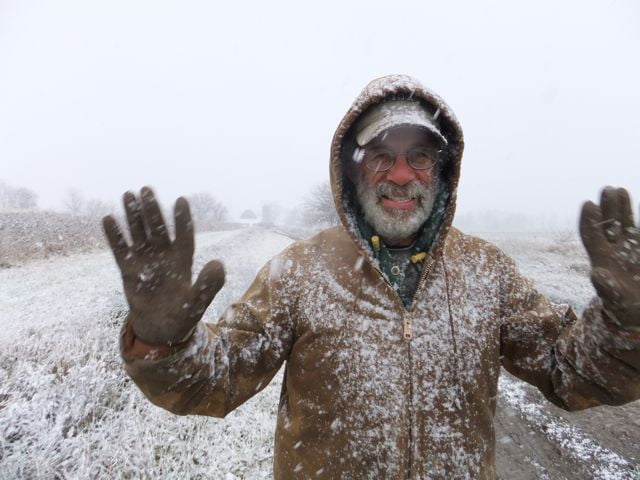
The snow showers on Monday were dramatic. Steve waves good bye and looks forward to his winter rest.
This is the final week of our regular CSA season. We would like to thank each of you for joining our farm this year. We appreciate your support and encouragement. We hope you enjoyed the produce and the experience. It was a good year, from our perspective. The late spring was frustrating but we found ourselves racing to keep up with the crops by summer. Moisture was erratic; we got seven inches in June, then almost no rain for two months. It was a good year for almost everything in the Brassica (cabbage) family, with loads of broccoli and surprisingly early harvests of cauliflower and Romanesco broccoli. The cabbage are dauntingly big. Pepper harvests were below average. We sent most of the peppers in the CSA boxes (instead of to our store customers) so maybe it wasn’t noticeable. Tomatoes and melons did great! This was our longest strawberry season ever. We have no complaints about that.
We were fortunate to gather an enthusiastic work crew this year. Steve struggled through midseason without an assistant farmer until Larry stepped in with his ability to fix anything. Our workers have begun moving on to their winter jobs. Many work at farms with winter greenhouse or hoophouse production. Others will travel, waitress, or nanny. One will drive a taxi cab. A few will work with us through the winter preparing our stored carrots and other crops for sale to the Willy Street and Outpost coops. Steve and I look forward to some quiet time to play with our kids and plan next season. Have a great winter! Beth
2013 Survey.
Tell us your thoughts on our CSA season. Use the link in this week’s email. We are particularly interested in members’ vegetable preferences, and whether the Local Thyme menus were useful. Here is your chance to tell us how to improve your CSA deliveries. We will carefully read through your comments this winter, and will incorporate your feedback as we plan next season.
2014 Registration.
We are preparing to open 2014 CSA registrations. Watch for an email from us soon. There will be an opportunity to register early at our 2013 rates. We will open registration for new members after December 1.
Final Details.
– Please make sure that everyone who participates in your CSA share knows the CSA has finished.
– Please return all empty CSA boxes this week. It’s best to unpack your box this week, and leave it behind. It’s OK to leave empty boxes at your site during the next two weeks.
– Our Local Thyme subscription is good for an entire year, so you have access to their website and recipes until spring. Use it this winter!
Food Safety Modernization Act Comments are due November 15.
See last week’s post for more info. Thanks to those of you who already submitted your comments,
Veggie List and Veggie Notes (week #26, green EOW)
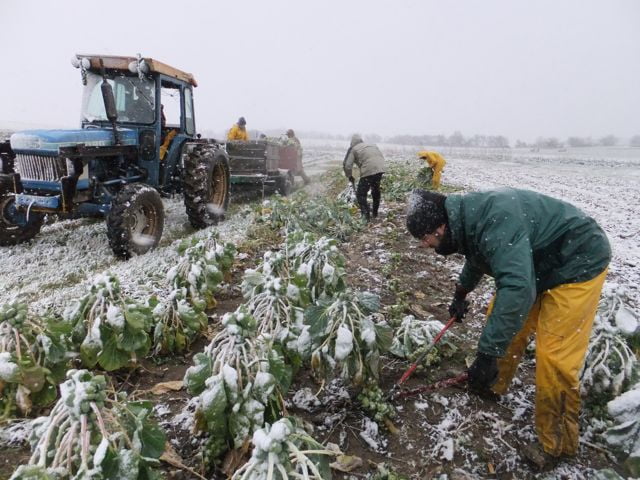
The crew gathered Brussels sprout stalks during the snow on Monday. Alex clips stalks while Carla, Clint, Michael, Bri and Steve load them on the wagon. We brought them back to the buildings so everyone could work inside the warm barn while snapping individual sprouts from the stalks.
Green cabbage, 1 large
Sweet potatoes (unwashed), about 2 lb
Brussels sprouts, 1 lb
Butternut squash
Beets, 2 lb
Celeriac, 1 root
Carrots, 2 lb
Onions, about 2
Sweet potatoes – As I explained last week, we dry-brushed the soil off the sweet potatoes. It is too risky to wash them this time of year without a warm place to dry them. Store your sweet potatoes at room temperature.
Butternut squash – Similarly, we dry-brushed the butternuts, but they will need more thorough washing.
Brussels sprouts – If you are a new CSA member, please approach Brussels sprouts with an open mind. Many of us grew up eating awful, overcooked Brussels sprouts. These Brussels sprouts are completely different. Here is how we cook Brussels sprouts: Wash the sprouts and trim the cut ends. Cut an X in the stem end of large sprouts. Cut a single slit in small or medium sprouts. This does two things. It helps the Brussels sprouts cook evenly, plus it allows them to soak up any marinade or dressing. Place in a pot with one inch of water in the bottom and steam until tender, 7 to 10 minutes. If the sprouts are uneven in size, then set aside the smallest ones and add to the pot after the larger ones have cooked for a few minutes. Don’t overcook them! You can also oven-roast Brussels sprouts. Here are a few dressing ideas for cooked sprouts:
– Sherry vinegar/olive oil/Dijon mustard/garlic/white wine/salt and pepper
– Balsamic vinegar/olive oil/garlic/salt and pepper
– Lemon juice and zest/melted brown butter/poppy seeds/white wine/garlic/salt
URGENT: Please comment on the food safety act
- On: November 06, 2013
 0
0
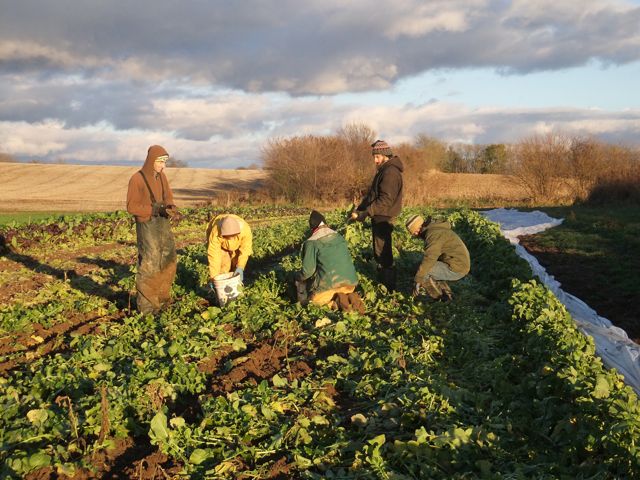
The crew harvests winter radishes. It was too muddy to use our mechanical root harvester, plus we find that harvesting by hand is easier on the brittle radishes. From left, Jon, Kelty, Alex, Clint, and Kyle.
Purple EOW members, this is your final delivery (November 7/8).
Weekly and green EOW members, you will receive your final box next week (November 14/15)
Wrap-up for purple EOW members. Thank you for being members of our farm this year! We hope you have enjoyed the experience. A few thoughts:
– Please read next week’s email for our annual survey. We will incorporate your comments into our plans for next year.
– Please return all your empty CSA boxes.
– We expect to open 2014 registration soon for returning Tipi members. Watch for emails from us.
Please comment on the Food Safety Modernization Act
The Food Safety Modernization Act (FSMA) is a piece of legislation currently under review by the Food and Drug Administration. It is an intimidating set of regulations that seek to overhaul food safety in the USA. There are sound ideas in the act, such as protecting fresh produce from exposure to raw manure. Unfortunately, this complex piece of legislation has enough bad ideas to drive many small and medium vegetable farms out of business. As summarized by the Michael Fields Agricultural Institute, “The (FDA)’s first draft of new safety rules has big problems. They will be costly, especially for smaller farmers. They conflict with National Organic Program rules and undermine conservation practices. They undercut CSAs and other essential markets in local food systems. What is bad for our farmers is bad for our consumers.”
Will it put us out of business? No, but it will make our job much more difficult, without improving the quality of your food.
The National Sustainable Agriculture Coalition (NSAC) has done a good job summarizing the current draft of the legislation. Go to the NSAC website to learn more about the Food Safety Act, and to read their assessment of the top problems with the proposed regulations.
The FDA is accepting comments on the FSMA until November 15. If you are concerned about maintaining your community of local farms, we encourage you to submit a comment to the FDA.
The Sustainable Ag Coalition has a good instructions on how to submit an effective comment, as well as links to the government submissions pages. We encourage you to submit your comment under both the Produce Rule and the Preventative Controls Rule. Our farm and CSA (and your food supply) will be affected by both pieces of legislation. Beth
Steve’s take on the Food Safety Modernization Act.
We don’t often talk with you about the cultural and political pressures that affect us as organic famers. Something is brewing that we want you to know about. The U.S. Food and Drug Administration (FDA) is putting together an administrative rule called the Food Safety Modernization Act (FSMA). Congress authorized this act, intending to improve the safety of the American food supply.
The FSMA, as currently drafted, would have a huge negative effect on our farm and other similar small and medium-sized vegetable farms, whether organic or conventional. The food safety rules call for extreme preventative measures that have not been shown to reduce foodborne illness. The FDA expects that compliance would cost a farm like Tipi about $30,000 per year. Smaller, younger farms could spend half their net income meeting these standards, forcing them out of business.
The whole draft rule is over 3,000 pages. I have not read all of it, but have gone through a few especially relevant topics. I’m relying on small farm and sustainable ag advocates who have digested and summarized this sprawling document.
The FSMA, as written in draft, is a true threat to the locally-oriented organic farms that feed you through CSAs, food coops, farmers’ markets and farm-to-school programs. See above for links to some well-researched information.
The FDA is taking comments on the FSMA rules through next Friday November 15. We ask you to help stop this damaging regulation by sending a short comment to the FDA. You don’t need to be overly technical. A comment like the one below (in your own words of course) would register your opinion:
“We are CSA members in Wisconsin and our family (or household) eats more fresh produce because of our CSA commitment. Do not put burdensome, unproven mandates on our farmers! We trust their food and their judgement. Your proposed FSMA rules would damage the local farms that we depend on for safe, high-quality food.”
Thank you for your time considering this. Steve
Veggie List and Veggie Notes (week #25, purple EOW)
Tip for cutting winter squash: If you want to peel or dice your butternut squash, microwave the intact squash on high for one minute. That’s enough to warm and soften the squash, making it much easier to peel. I find this trick useful even when just cutting the butternut in half.
Russet potatoes, about 3.5 lb
Sweet potatoes (unwashed), about 2 lb
Butternut winter squash
Collard greens
Leeks, about 1.5 lb
Carrots, 2 lb
Beauty Heart radish, 1 lb, about 2
Onion, 1
Broccoli, 1 modest head or some side shoots
Next week’s box will probably contain green cabbage, butternut squash, sweet potatoes, beets, celeriac, carrots, onions and Brussels sprouts.
Russet potatoes – Chris Malek sent us big beautiful russets this week, perfect for baking.
Sweet potatoes – These are unwashed. Sweet potatoes need warm storage. It is too risky to wash them this time of year without a warm place to dry them, so we ran them through a dry brusher to knock off most of the dirt. This delivery is mostly the Beauregard variety. Here are a few things we’ve learned about sweet potatoes:
– Store your sweet potatoes at room temperature. They suffer chilling injury below 50 F.
– The sweet potatoes we grow require slightly longer cooking than ones from the supermarket, perhaps because they contain higher moisture so soon after harvest. Cook thoroughly for best flavor and texture.
– Sweet potatoes are good at any size. We have cooked everything from tiny to jumbo and consistently find that all sizes taste good.
– We have a new favorite way to roast sweet potatoes. We used to prepare sweet potato fries. Now we just quarter the potatoes, rub with olive oil, dust with salt and place cut-side-down on a cookie sheet. Roast in a 450 F oven without turning until soft. The flavors will caramelize (like sweet potato fries) but preparation is simpler and the cooking time less exacting. Slender sweet potato fries go from undercooked to overcooked in the blink of an eye.
Butternut winter squash – Almost everyone will receive the JWS6823 variety. We tried several new winter squash varieties this year. This one did quite well and has good flavor. This variety produces small squash, about the same size as the Metro we sent a few weeks ago.
Collard greens – These end-of-season collards need more extended cooking than tender spring-grown collards. They can handle long braising or simmering. Remove the midveins before cooking.
Beauty Heart radish (round, white and pale green exterior, bright pink interior) – The interior color is lovely. Slice thinly and add to salads, cook lightly in mixed vegetable medleys or cut into matchsticks and add to pasta salads. We enjoy grated carrot and Beauty Heart salads all winter.


